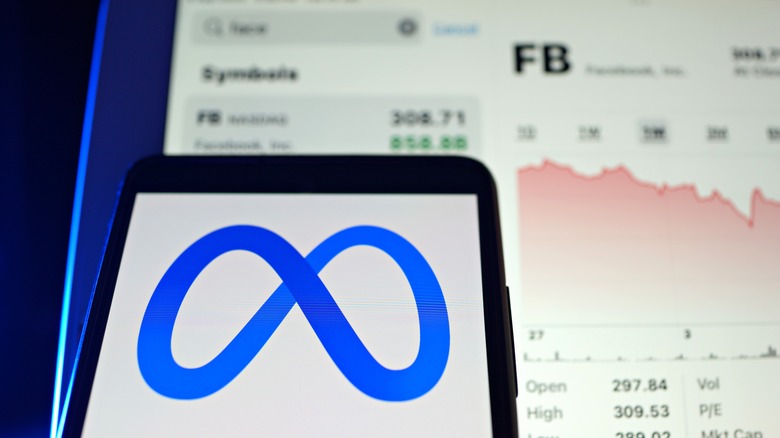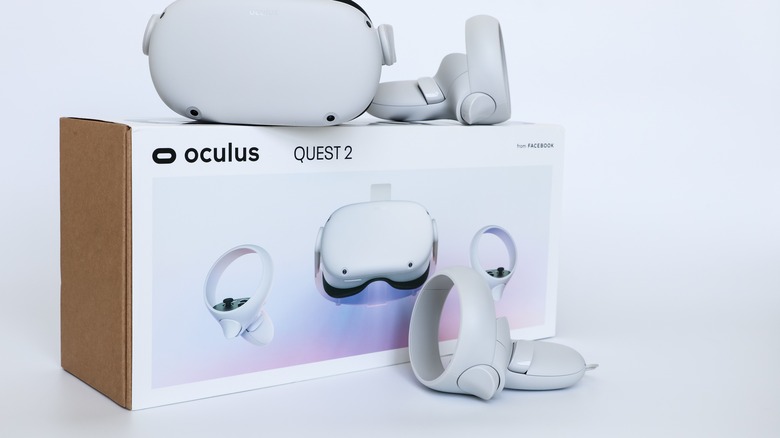Even Employees Are Avoiding The Metaverse
Meta has unveiled its newest headset, and it's meant to do a lot more than just play VR games. There are a few major differences between the Quest Pro and Meta's standalone gaming headset, the Quest 2. The most obvious one is the price, with the Quest 2 costing $399 and the Quest Pro coming in at an eye-watering $1,499. Meta justifies the price with claims that the Quest Pro will be one of the most advanced AR/VR headsets on the market, packing cutting-edge technology that may trickle down to its entry-level headsets later on.
While the Quest Pro has all of the same gaming applications as the Quest 2, VR gamers aren't really the target market. Meta is pitching the headset to businesses, claiming it is an ideal way to collaborate, hold meetings, and design products. Features like the color passthrough and controller styluses play into this, but the business applications go far beyond the hardware side of things. Programs like Horizon are intended to allow users to "hang with friends, meet new people, play games, and attend cool events," according to the company. It can also be used to hold meetings, but not many people are taking their work life into the metaverse.
Zuckerberg's metaverse is one of the biggest gambles in history
Mark Zuckerberg is a strong believer in the metaverse concept. The Facebook founder seems to be gambling his company's future success on VR, AR, and the metaverse as a whole taking off. If he's right, Meta could be the main player in a market worth trillions annually. If he's wrong, then the financial impact both he and his company have already felt might just be the tip of the iceberg. While most of Meta's departments are doing well, the area responsible for Zuckerberg's AR and VR projects is losing tens of billions of dollars.
This, coupled with decreased shareholder confidence and an overall downturn in tech stocks, has led to Zuckerberg losing around half of his net worth so far. The losses may explain the Quest 2's price increase or the hefty price tag the company's new flagship device is carrying. The metaverse concept is a gamble, and its backers will need to keep shareholders happy if they want a chance of seeing their longer-term bets pay out.
As outlined in the early stages of Connect 2022, the gaming side of things is doing quite well. During the keynote, it was confirmed that a third of Quest apps have amassed over $1 million in sales. Major intellectual properties like Marvel comics and "The Walking Dead" have stakes in the VR gaming world. Original concepts like "Blade and Sorcery," along with "BoneLabs," are also incredibly popular. But the metaverse is about more than gaming, and for Zuckerberg's gamble to pay off, VR and AR may have to carve out a market in other areas. As an alternative to the office, it's not doing well.
Meta staff may not be on board with the concept
The metaverse's potential as a replacement for the traditional office is even facing skepticism from the company's own employees, it seems. As you may expect, Mark Zuckerberg is keen for his own employees to embrace the technology he is gambling billions of dollars on. However, The New York Times reports that the company uncovered some pretty major issues after employees were instructed to hold more metaverse-based meetings in the Horizon Workrooms app. Allegedly, "many" of Meta's employees didn't own one of the company's headsets, while others had a Quest but just hadn't bothered to set it up.
The alleged lack of enthusiasm on the Meta staff's part could be explained by another statistic the article quotes. Of 1,000 employees surveyed by the social network Blind, a total of 420 (that is, 42%) claimed they did not understand the company's "metaverse strategy." This all fits in with reports from several months ago, which described the platform as rife with quality issues and claimed that few employees enjoyed using it. According to The Verge, Meta's VP of Metaverse, Vishal Shah, acknowledged that the platform had various bugs and stability issues, and ordered a "quality lockdown" until the glaring problems were solved.
However, Shah seems to be one of the executives keen on Meta's staff embracing one of the company's key metaverse selling points. The executive allegedly called for weekly Horizon-based meetings and is reported to have said, "Everyone in this organization should make it their mission to fall in love with Horizon Worlds. You can't do that without using it. Get in there. Organize times to do it with your colleagues or friends, in both internal builds but also the public build so you can interact with our community."
This isn't the first problem Horizon has faced
Horizon has had a bit of a hard time so far. The platform is essentially an early version of the metaverse, offering users the options to create avatars, hang out, attend meetings, and engage in recreational activities. The problem is, Horizon Worlds had a terrible launch. Spectators were quick to jump on the horrendous graphics, likening them to something you'd see on a Nintendo Wii game from 15 years ago. Zuckerberg responded to the criticism by promising a major graphical update that would pull the Horizon platform closer to the level you would expect a futuristic social device to be operating on (via Kotaku).
As you can see above, the improved graphical environment was on display during Connect 2022. Meta even answered a lot of its users' prayers by adding legs to the avatars users create. The company is also working with developers to get those avatars into the third-party apps that are available on the platform. A metaverse like the one Zuckerberg pitched to the world around this time last year is a long, long way off, but platforms like Horizon and the way it interacts with other VR apps are an obvious starting point for that kind of thing. Whether the public accepts it, businesses embrace it, and the technology supports it are other discussions for other times. For now, Meta needs to get the basics right before both its staff and investors lose faith in the project.


